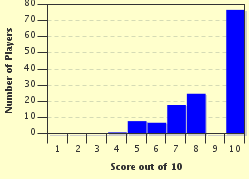Quiz Answer Key and Fun Facts
1. The main sections of a musical or play
2. Instructions that tell actors exactly where they are to be on stage
3. When an actor is to read from an unrehearsed script
4. A rehearsal with costumes and make-up right before a show opens
5. Afternoon performance of a show
6. A meeting held by a director after a rehearsal or performance
7. All items in a play excluding costumes and scenery that assist in telling story
8. The date by which lines must be memorized
9. The number of times a show is performed
10. The time an actor must report to the theater for a rehearsal or performance
Source: Author
ponycargirl
This quiz was reviewed by FunTrivia editor
looney_tunes before going online.
Any errors found in FunTrivia content are routinely corrected through our feedback system.

